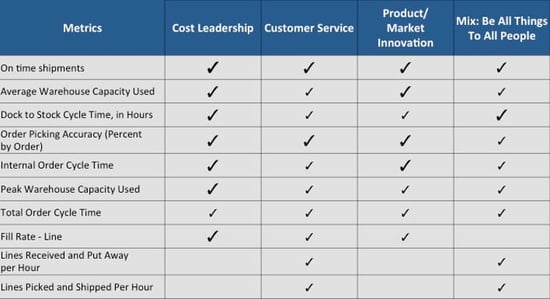
AUTHORS:
Joseph Tillman, CTL, SCOR-P 
Karl Manrodt, PhD 
Donnie Williams, PhD 
Does it matter to measure strategy with warehouse metrics? The answer to this seems obvious: of course measuring strategy matters, until you think about how nebulous and downright ambiguous the term “strategy” is.
One organization’s strategy might be accurate and well developed right now, but a changing environment could cause it to become dated and ineffective. But perhaps this line of thought is too philosophical.
Regardless of the definition of strategy, we’ve all been taught that it matters. Books, articles, speeches and other countless blogs have focused on aligning internal processes and measures with the strategic vision of the organization. We’ve taught classes about this as well.
Yet, what is happening today? Does the strategy selected by the organization really impact what it is doing at the tactical level? To answer this question, we looked into whether there’s a difference in four basic strategies (see table below) and the metrics used to measure performance. To increase the power of the analysis, we used warehouse performance data from the past five years.
The table below shows the top 10 warehouse metrics used by strategy by the respondents in the DC Velocity and Warehousing Education and Research Council’s annual benchmarking study “DC Measures.” Seven of the top 10 metrics are common across each of the four strategies.
In light of this, the question to ask is: what does it mean if all of the firms employing different strategies focus on the same warehouse metrics? In other words, how are they differentiating themselves? After analyzing the data, we’ve come up with five key points.

1. NO DIFFERENTIATION BETWEEN THE STRATEGIES
It is interesting to note there is very little differentiation between the warehouse’s metrics employed in the different strategies. It was expected companies using different strategies would use different metrics to support their goals, but this was not the case. So does the strategy employed matter when determining which metrics are the most significant to your firm?
2. LITTLE AGREEMENT WITHIN EACH STRATEGY
While we can see seven of the top ten metrics are used by all of the firms, with the exception of cost leadership, there seems to be disagreement among strategies concerning the most important metrics that support a firm’s goals. For example, among the participants employing the customer service strategy, only two of the top ten warehouse metrics are utilized by more than 70% of the firms, as represented in the table above by the checkmarks in bold. Similarly, the mix strategy only has two of the top 10 metrics that are utilized by 70% or more of the respondents. Interestingly, respondents employing the cost leadership strategy are much clearer about which metrics are relevant to their firm, as seven of the top 10 are used by over 70% of the respondents.
3. TALENT
It is surprising only one strategy applied an employee metric in their top 10, cost leadership. Why is this surprising? Because without fail, we hear companies say that their employees are the reason for their success or competitive advantage. While there is a lot of concern in the industry about talent and talent retention, companies have yet to translate that concern into a top priority inside their performance measurement system.
4. FINANCIAL MEASURES LACKING
Additionally, it is surprising that only one strategy has financial metrics included in their top 10. As much as firms are focusing on costs and margin pressures in today’s economy, our expectation was that financial metrics would have a greater emphasis among the respondents for each strategy.
5. DOES STRATEGY MATTER?
The basic question is: Are companies employing their logistics capabilities to truly differentiate themselves in the market place? Since the respondents are DC Velocity readers and WERC members, one might expect there to be greater variation by strategy. Shouldn’t companies choose strategies and warehouse metrics that help them achieve their strategic goals?
Two observations:
A. METRIC UTILIZATION VERSUS IMPORTANCE
Simply because a strategy applies a specific metric, it doesn’t mean that the company emphasizes or weights that particular metric as being more important than others. For example, all of the strategies use Dock-to-Stock Cycle time as one of the top ten metrics. But Dock-to-Stock Cycle time may be more important for the customer service strategy than the mix strategy
There is an interesting level of agreement about what measures most strategies use, and the similar performance of the respondents on these top measures. This leads us to consider one final question:
Why? Perhaps this is a question to address in the coming year.



